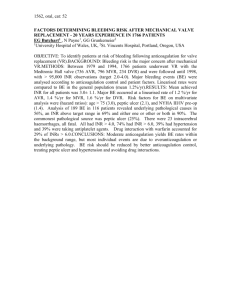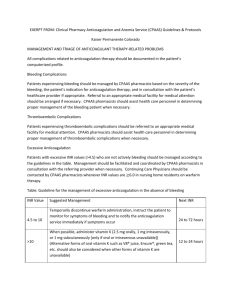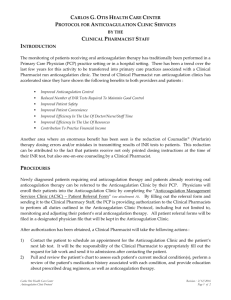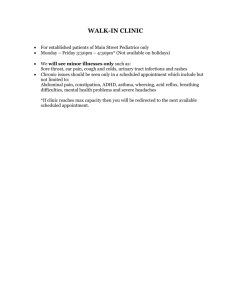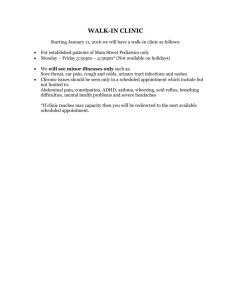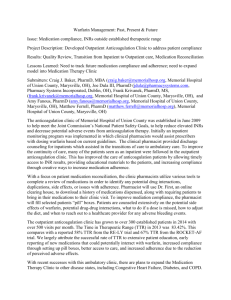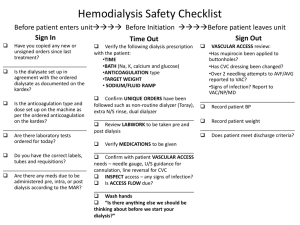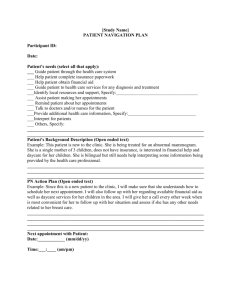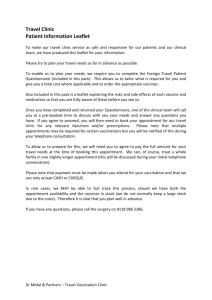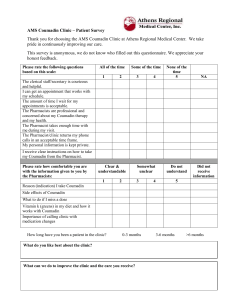Anticoagulation Clinic - Pharmacist Procedures
advertisement
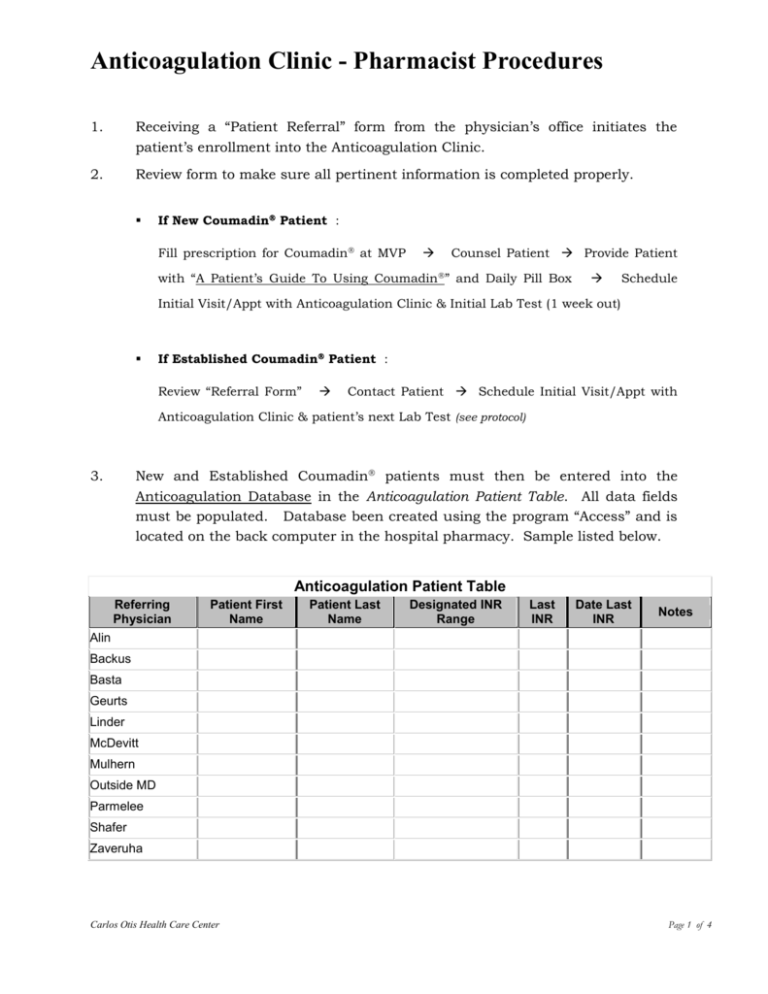
Anticoagulation Clinic - Pharmacist Procedures 1. Receiving a “Patient Referral” form from the physician’s office initiates the patient’s enrollment into the Anticoagulation Clinic. 2. Review form to make sure all pertinent information is completed properly. If New Coumadin Patient : Fill prescription for Coumadin at MVP Counsel Patient Provide Patient with “A Patient’s Guide To Using Coumadin ” and Daily Pill Box Schedule Initial Visit/Appt with Anticoagulation Clinic & Initial Lab Test (1 week out) If Established Coumadin Patient : Review “Referral Form” Contact Patient Schedule Initial Visit/Appt with Anticoagulation Clinic & patient’s next Lab Test (see protocol) New and Established Coumadin patients must then be entered into the Anticoagulation Database in the Anticoagulation Patient Table. All data fields must be populated. Database been created using the program “Access” and is located on the back computer in the hospital pharmacy. Sample listed below. 3. Anticoagulation Patient Table Referring Physician Patient First Name Patient Last Name Designated INR Range Last INR Date Last INR Notes Alin Backus Basta Geurts Linder McDevitt Mulhern Outside MD Parmelee Shafer Zaveruha Carlos Otis Health Care Center Page 1 of 4 Anticoagulation Clinic 4. New and Established Coumadin patients with scheduled appointments must then be entered into the Anticoagulation Database in the Anticoagulation Patient Appointment Schedule Table. All data fields must be populated. Database been created using the program “Access” and is located on the back computer in the hospital pharmacy. Sample listed below. Anticoagulation Patient Appointment Schedule Table Referring Physician Alin Backus Linder Geurts Shafer Patient First Name Suzanne Greg Monica Sara Jim Patient Last Name Light Dean Lightfoot Niklas Heal Appointment Date 12/13/2003 01/14/2004 12/31/2003 12/31/2003 01/14/2004 Appointment Time 0800 0900 1130 1300 1430 Notes New Patient Adjustment Made-F/U Lab Adjustment Made-F/U Lab Established/Stable Pt New Patient 5. Fill out Lab Sheet for patient’s INR and send it to Patient Admissions. (Sue Tweedy has file for Anticoagulation Clinic patient INR’s) 6. A Daily Patient Appointment List should be run EVERY morning by a pharmacist for that day in order to see what patient’s are scheduled for labs and consultation. The report should then be sorted by “Appointment Time” and printed in landscape format. The appointment list can be found in the Anticoagulation Database. Sample(s) of the Daily Patient List is shown below. Anticoagulation Clinic Daily Appointments Appointment Date 12/31/2003 12/31/2003 Appointment Time 1130 1300 Patient First Name Monica Sara Patient Last Name Lightfoot Niklas Notes Adjustment Made-F/U Lab Established/Stable Pt Anticoagulation Clinic Daily Appointments Appointment Date 01/14/2004 01/14/2004 7. Appointment Time 0900 1430 Patient First Name Greg Jim Patient Last Name Dean Heal Notes Adjustment Made-F/U Lab New Patient Contact physician’s office to obtain patient’s chart before patient’s initial visit to the Anticoagulation Clinic. Carlos Otis Health Care Center Page 2 of 4 Anticoagulation Clinic 8. Review chart and patient’s medical history. Begin filling out COHCC Warfarin (Coumadin) Service : History & Checklist before patient’s initial visit to the Anticoagulation Clinic. 9. During appointment with patient take a complete drug history from patient and complete the COHCC Warfarin (Coumadin) Service : History & Checklist. 10. Teach the patient the how to recognize signs/evidence of bleeding, and when to report these to the pharmacist and/or physician. 11. Instruct the patient to take his/her Coumadin at the same time every day. 12. Advise the patient to wear a medic-alert bracelet with the name of the drug on it or the patient should carry a wallet card with his or her name, name of the drug, and the name of the physician/pharmacist who is providing the care for the use in emergency situations. 13. Advise the patient not to take or discontinue any medications without the direction of their physician/pharmacist. Warn the patient to avoid over-the-counter products that contain aspirin, other salicylates, alcohol, acetaminophen, or drugs that interact with Coumadin . 14. Teach the patient that eating inconsistent amounts of foods containing Vitamin K may alter their anticoagulant effects. Stress the importance of consistency. 15. Instruct the patient to about the possibility of bruising. Also, advise the patient about using an electric razor and a soft bristle toothbrush to eliminate potential hazards and excessive bleeding due to cuts. 16. Advise the patient to avoid alcohol or at least keep ingestion consistent. 17. Review and discuss INR results with patient, making appropriate adjustments if necessary per protocol. If Adjustment Required : Refer to Weekly Dosing Equivalents Form Make Adjustment to Patient’s Dosing Regimen Fill out Adjustment Notification form Send Notification to Medical Director/PCP 18. Schedule patients next visit to the Anticoagulation Clinic and Lab Test according to protocol. Carlos Otis Health Care Center Page 3 of 4 Anticoagulation Clinic 19. Fill out Lab Sheet for patient’s next INR and send it to Patient Admissions. (Sue Tweedy has file for Anticoagulation Clinic patient INR’s) 20. Fill out the Anticoagulation Monitoring Flow Sheet and place the form in the designated area of the patient’s chart. 21. Update the Anticoagulation Patient Table in the Anticoagulation Database after each clinic visit. Sample listed below. Anticoagulation Patient Table Referring Physician Backus Basta 22. Patient First Name Greg Sara Patient Last Name Dean Niklas Designated INR Range 2.0 – 3.0 2.5 – 3.5 Last INR 3.8 2.8 Date Last INR 01/01/2004 11/14/2003 Update the Anticoagulation Patient Appointment Schedule Table Anticoagulation Database after each clinic visit. Sample listed below. Notes On Abx Stable in the Anticoagulation Patient Appointment Schedule Table Referring Physician Alin Patient First Name Suzanne Patient Last Name Light Appointment Date 12/20/2003 Appointment Time 0800 Notes 1st Lab - Follow Up Note : Elderly patients and patients with renal and hepatic failure are especially sensitive to Coumadin effects and should be monitored very closely. Questions, Comments &/o Additions : _____________________________________________________________________________________________ _____________________________________________________________________________________________ _____________________________________________________________________________________________ _____________________________________________________________________________________________ _____________________________________________________________________________________________ Carlos Otis Health Care Center Page 4 of 4
